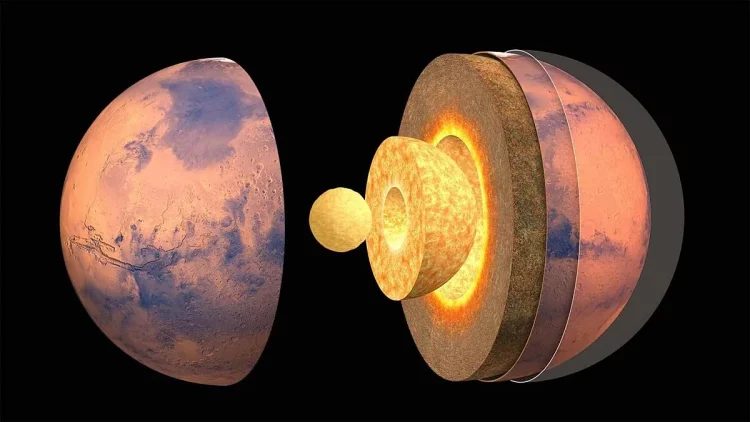Introduction
Understanding the composition of planets is fundamental to the study of planetary science. The materials that make up planets not only define their physical characteristics but also provide insights into their formation, evolution, and potential for supporting life. This article delves deeply into the composition of planets, exploring the various types of materials found in planetary bodies, their origins, and the processes that shape them.
Planetary Composition Overview
Planets are diverse in their composition, ranging from rocky terrestrial worlds to gas giants and icy bodies. Each type of planet is characterized by distinct materials and structures. To comprehend what planets are made of, it’s essential to explore the different types of planets and their core components:
- Terrestrial Planets: These are rocky planets with solid surfaces. They include Mercury, Venus, Earth, and Mars. Terrestrial planets are primarily composed of silicate minerals and metals.
- Gas Giants: Gas giants such as Jupiter and Saturn are predominantly made of hydrogen and helium, with small rocky cores. Their atmospheres are characterized by thick layers of gases and clouds.
- Ice Giants: Uranus and Neptune are classified as ice giants. They contain significant amounts of water, ammonia, and methane ices, in addition to hydrogen and helium.
- Dwarf Planets: Dwarf planets like Pluto and Ceres have compositions that can vary widely, often including a mix of rock and ice.
Composition of Terrestrial Planets
Terrestrial planets have solid, rocky surfaces and share several common features in their composition:
1. Core
The core of a terrestrial planet is primarily composed of metals. It is usually divided into two layers:
- Inner Core: The innermost layer, composed mainly of iron and nickel. It is solid due to the extreme pressure despite the high temperatures.
- Outer Core: Surrounding the inner core, this layer is liquid and also consists primarily of iron and nickel. The movement of the liquid outer core generates the planet’s magnetic field.
2. Mantle
The mantle lies above the core and is made of silicate minerals that are rich in iron and magnesium. It is divided into:
- Upper Mantle: Includes the lithosphere (the rigid outer layer) and the asthenosphere (a more ductile region). The upper mantle contains minerals such as olivine and pyroxene.
- Lower Mantle: Extends to the outer core and is characterized by denser minerals like perovskite and magnesiowüstite.
3. Crust
The crust is the outermost layer of a terrestrial planet and is composed of lighter silicate minerals. It is divided into:
- Continental Crust: Composed mainly of granitic rocks, which are rich in silicon and aluminum.
- Oceanic Crust: Made predominantly of basaltic rocks, which contain more iron and magnesium.
Composition of Gas Giants
Gas giants are characterized by their massive atmospheres and lack of a solid surface:

1. Atmosphere
The atmospheres of gas giants are predominantly composed of hydrogen and helium, with traces of other gases such as methane, ammonia, and water vapor.
- Jupiter: The largest gas giant, with an atmosphere primarily made up of hydrogen and helium. It also has clouds of ammonia and methane.
- Saturn: Similar to Jupiter in its atmospheric composition, Saturn’s atmosphere contains hydrogen, helium, and methane. Its prominent rings are made of ice and rock particles.
2. Interior Structure
Gas giants have a core that is thought to be composed of rock and metal. Surrounding this core is a layer of metallic hydrogen, which acts as a conductor and generates the planet’s magnetic field. Above this layer is the thick gaseous atmosphere.
Composition of Ice Giants
Ice giants differ from gas giants in their composition and structure:
1. Atmosphere
Ice giants have atmospheres that contain a higher proportion of “ices” compared to gas giants. These ices include water, ammonia, and methane, which are present in significant quantities.
- Uranus: The atmosphere is composed of hydrogen, helium, and methane, giving the planet its blue-green color. Methane absorbs red light and reflects blue light.
- Neptune: Similar to Uranus, Neptune’s atmosphere contains hydrogen, helium, and methane. The planet’s striking blue color is attributed to its high methane content.
2. Interior Structure
Ice giants have a rocky core surrounded by a thick mantle of water, ammonia, and methane ices. The outer layers consist of a gaseous atmosphere with hydrogen and helium.
Composition of Dwarf Planets
Dwarf planets exhibit a wide range of compositions, reflecting their varied origins and characteristics:
1. Pluto
Pluto, located in the Kuiper Belt, has a composition that includes both rock and ice. Its surface is covered with nitrogen ice, methane ice, and traces of carbon monoxide. Pluto’s interior is thought to contain a mixture of rock and water ice.
2. Ceres
Ceres, the largest object in the asteroid belt between Mars and Jupiter, has a composition that includes a mix of rock and water ice. Its surface is characterized by bright spots of sodium carbonate, suggesting the presence of briny water in the past.
Formation and Evolution of Planetary Materials
Understanding the composition of planets involves examining how their materials formed and evolved over time:
1. Formation
Planets formed from the protoplanetary disk, a rotating disk of gas and dust surrounding a young star. As particles collided and stuck together, they formed planetesimals, which eventually coalesced into planetary bodies.
- Terrestrial Planets: Formed closer to the Sun where temperatures were higher, leading to the formation of rocky materials and metals.
- Gas Giants: Formed farther from the Sun where temperatures were lower, allowing for the accumulation of ices and gases.
- Ice Giants: Formed in regions where both gas and ices were present, resulting in their unique composition.
2. Differentiation
As planets formed, they underwent a process of differentiation, where denser materials sank to the center to form the core, while lighter materials rose to form the mantle and crust. This process played a crucial role in shaping the internal structure of planets.
3. Geological Activity
Geological activity, such as volcanic eruptions and tectonic processes, has also influenced planetary composition. For example:
- Earth: Plate tectonics and volcanic activity continually reshape the planet’s surface and contribute to its dynamic geology.
- Mars: Evidence of ancient volcanic activity and tectonic processes provides insights into the planet’s geological history.
Research and Exploration
Studying planetary composition involves both remote observations and in-situ measurements:
1. Telescopic Observations
Observations from telescopes, including space-based observatories, provide valuable data on planetary atmospheres and surface compositions. Spectroscopy, for example, allows scientists to analyze the light reflected or emitted by planets and determine their chemical makeup.
2. Space Missions
Space missions play a crucial role in studying planetary materials up close:
- Mars Rovers: Rovers like Curiosity and Perseverance analyze Martian soil and rock samples, providing detailed information about Mars’ composition and history.
- Voyager Probes: The Voyager missions provided data on the composition of the outer planets and their moons, enhancing our understanding of gas giants and their environments.
- Rosetta Mission: Rosetta’s study of Comet 67P provided insights into the composition of comets and their role in the solar system’s formation.
Future Directions
The exploration of planetary composition will continue to evolve with advancements in technology and new missions:
1. Advanced Instruments
Future missions will employ advanced instruments for more detailed analysis of planetary materials. This includes enhanced spectrometers, mass spectrometers, and drilling tools to obtain and analyze samples from planetary surfaces and atmospheres.
2. Human Exploration
Human missions to the Moon, Mars, and beyond will provide opportunities for in-situ analysis and sample collection, offering new insights into planetary materials and enabling more detailed studies.
3. International Collaboration
Collaborative efforts between space agencies and research institutions will enhance our ability to study planetary composition. Shared resources and expertise will contribute to more comprehensive exploration and understanding.
Conclusion
The composition of planets is a fascinating and complex subject that reveals much about their formation, evolution, and potential for supporting life. From the rocky surfaces of terrestrial planets to the gaseous envelopes of gas giants and the icy materials of ice giants, each planet offers unique insights into the nature of planetary bodies.
As technology advances and exploration continues, our understanding of what planets are made of will deepen, providing valuable knowledge about the solar system and the broader universe. The study of planetary composition not only enriches our scientific knowledge but also inspires curiosity and wonder about the cosmos.











































Discussion about this post